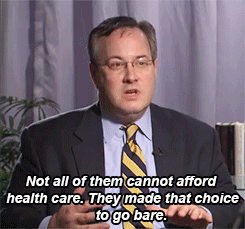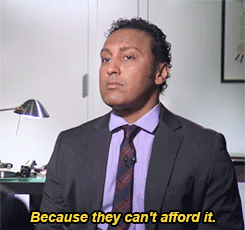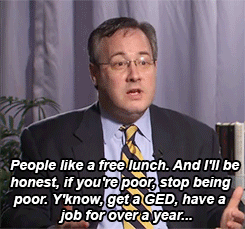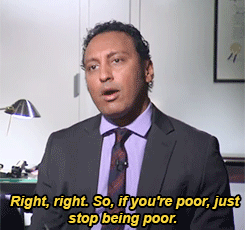#pbs newshour
Video
youtube
"Canvas" is the arts and culture series for PBS NewsHour. The way they presented the story and the questions asked is among the best I've seen / heard. The approach is magnificent. Geddy is well spoken and gave thoughtful answers.
A definite must watch.
20 notes
·
View notes
Text
For every minimum wage slave out there with shitty healthy insurance.






#minimum wage#just stop being fucking poor#WTF is wrong with you poor people anyway#get up take a shower brush your teeth make some coffee stop being poor#IT'S THAT EASY#poor#poverty#PBS Newshour
7 notes
·
View notes
Text
by Ricki Hollander
PBS Newshour continues to present one-sided coverage of the Hamas-Israel war, interviewing pro-Hamas propagandists with no Israeli representatives to counter them. (See: “Hamas Propaganda by Doctors Without Borders, Courtesy of PBS NewsHour”) The latest example is its Dec. 26, 2023 episode featuring former PA spokeswoman Nour Odeh to discuss recent events. (View clip here.)
After reciting the (unconfirmed) casualty statistics put out by Hamas –‘the death toll in Gaza is nearing 21,000, mostly women and children according to Palestinian officials” – interviewer Amna Nawaz questioned Odeh about “the proposed peace plan put forward yesterday by Egypt and Qatar” which “essentially calls for the phased release of hostages held by Hamas and also Palestinians held by Israel, and for a united technocratic Palestinian government# that would oversee Gaza and the West Bank.”
Odeh responded that she is “puzzled that the Egyptians would also include negotiations with Israel and the U.S. really on the internal Palestinian issue of who governs and how” and made clear her position that Hamas should continue to play a role in governing the Palestinians, that Israel should have no say in the matter and that the world should just accept it.
“…[Hamas] remains part of the political scene because that’s inevitable. There’s no way that Hamas is going to cease to exist…And everyone has to come to terms with that…What kind of role would Hamas have in the wider political context in the Palestinian political scene, these are things that Palestinians need to agree on and that, quite, frankly, the world has to come to terms with, because if this veto on who can — who is an acceptable Palestinian political player continues, then there is more of a chance that this war will continue…”
In answer to the interviewer’s question about Israel’s insistence that Hamas be eradicated and no longer play a role in Palestinian governance as a prerequisite to peace, Odeh responded that “it should not be up to the Israelis.”
Odeh promoted a Hamas role for the governance of Palestinians, insisting that Hamas plays a large role in the West Bank as well and “in exile” and that the Palestinians “need to be able to come up with a formula…that can be functional and inclusive and representative…in order for dialogue about ending the occupation and the root cause of all this misery…”
Neither the interviewer nor any Israeli representatives pointed out that such a peace plan would necessarily entail the eradication of the Jewish state, which Hamas has repeatedly made clear is its mission and the reason it has widespread Palestinian support.
Instead, Nawaz moved on to question Odeh about “the displacement of Palestinians,” pointing to an opinion piece in the Jerusalem Post by an Israeli geologist about “Why moving to the Sinai peninsula is the solution for Gaza’s Palestinians”. This served as an invitation for another rant by Odeh demonizing Israel:
“I think that the Israelis are more comfortable talking about a potential atrocity crime, as experts of international law have warned. In my opinion, this was the plan all along, starving a population, depriving them of food and water, destroying the infrastructure, breaking down the health system, making sure that the region occupied now is basically uninhabitable, and pushing the majority of the population into a small, tiny portion at the Egyptian border. It was all meant to kind of nudge the population, if not outright forcibly expel it, into the Sinai. And now they’re more comfortable saying that, probably because they haven’t really had any pushback about all the other violations of international law that have been committed for over 80 days now.”
There was no Israeli representative to counter Odeh. Instead, Nawaz at this point asked:
“Israel, I must put to you, will say that this has all been about national security, that October 7th changed everything. The steps that they’re taking now is to make sure that horrific day never happens again. What would you say to that?”
PBS producers should have been familiar with Odeh’s refusal to condemn Hamas’ atrocities on Oct. 7th, the deadliest massacre of Jews since the Holocaust. They could easily have known that Odeh’s response to Hamas’ savagery and genocidal rhetoric is to deflect from Hamas to blame and demonize Israel. Her posts on X/Twitter on October 7th did just that, insisting that what had happened was “not about Hamas” but about “a moment in history that reflects just how deadly this untenable situation is, the cost of international failure & double standards & the cost of racist & irresponsible apathy to Palestinian rights & lives.” PBS producers might have predicted that she would turn immediately to demonizing Israel, as she did on October 7th:
“All the news that has been ignored about Israeli settler pogroms, settler raids of AlAqsa, the 🇮🇱 gov’s erasure of Palestine & the Palestinians, the choking inhumane siege of Gaza, the silencing & maligning of pro-justice & pro-Palestine voices worldwide – they are inescapable.”
Odeh compared Hamas’ barbaric actions to those of Ukrainians defending themselves from Russia’s brutal aggression and continued to condemn Israel as the root cause. For example, her posts on October 7th included:

12 notes
·
View notes
Text
Major pet peeve of mine- people on social media saying why is nobody talking about this/ the mainstream news isnt talking about this. Because 90% of the time a quick google search will tell you that yeah they fucking are.
The most egregious is a post I just saw that said this and then linked an article from npr and pbs newshour- two of our best mainstream media news outlets! And both funded by our tax dollars so they tend not to be influenced by corporations or trends.
I beg of you before you reblog posts like this to do a little research first. Because my worry is that this is a trend where people distrust reliable, great reporters and news organizations that have lawyers and experts fact checking everything they put in writing or on air. And instead they get their news from social media where misinformation is rampant and often times on purpose.
Ive honestly gotten to the point that I trust nothing important on social media - stop getting your news here!! Go to pbs and npr and read their articles. Find reporters and experts you trust and learn information directly from them. And stop putting down organizations as a whole like msnbc and cnn. I know they aren't perfect (especially with the owner of cnn seeming to be influencing them more) but they employ thousands of people to make sure they are being as accurate as possible and talking about what is important. You cannot get that level of fact checking and legal liability from any social media source.
And when you see any news from any source (including these) truly use your critical thinking. Of course there are times where Ive disagreed or questioned news. As I said Cnn has in the past few years made a few choices that I think are the result of their owner. My local news ran a story with a slightly off opinion and when I looked it up, the network posibly had some influence there.
But dont throw the baby out with the bathwater!!! Yes they arent perfect but nothing is and Id far rather get my news from organizations, institutions, and people who are legally liable for what they say and have huge teams of people working together to present accurate news to people. If people stop trusting all mainstream media news sources regardless, I think we are doomed to be misinformed and manipulated by people and bots.
6 notes
·
View notes
Text
The U.S. House passed a bill Thursday that would allow Puerto Rico to hold the first-ever binding referendum on whether to become a state or gain some sort of independence, in a last-ditch effort that stands little chance of passing the Senate.
The bill, which passed 233-191 with some Republican support, would offer voters in the U.S. territory three options: statehood, independence or independence with free association.
“It is crucial to me that any proposal in Congress to decolonize Puerto Rico be informed and led by Puerto Ricans,” said Rep. Raúl Grijalva, D-Ariz., chairman of the House Natural Resources Committee, which oversees affairs in U.S. territories.
The proposal would commit Congress to accept Puerto Rico into the United States as the 51st state if voters on the island approved it. Voters also could choose outright independence or independence with free association, whose terms would be defined following negotiations over foreign affairs, U.S. citizenship and use of the U.S. dollar.
Majority Leader Steny Hoyer, who has worked on the issue throughout his career, said it was “a long and torturous path” to get the proposal to the House floor.
“For far too long, the people of Puerto Rico have been excluded from the full promise of American democracy and self-determination that our nation has always championed,” the Maryland Democrat said.
After passing the Democrat-controlled House, the bill now goes to a split Senate where it faces a ticking clock before the end of the year and Republican lawmakers who have long opposed statehood.
Puerto Rico Gov. Pedro Pierluisi, of the pro-statehood New Progressive Party, traveled to Washington for the vote. “It’s going to be a historic day because it’s going to create a precedent that we hadn’t had until now,” he said.
Members of his party, including Puerto Rico Resident Commissioner Jenniffer González, cheered the expected approval of the bill, although reaction in the U.S. territory was largely muted and tinged with frustration since it is expected to be voted down in the Senate.
The proposal of a binding referendum has exasperated many on an island that already has held seven nonbinding referendums on its political status, with no overwhelming majority emerging. The last referendum was held in November 2020, with 53% of votes for statehood and 47% against, with only a little more than half of registered voters participating.
The proposed binding referendum would be the first time that Puerto Rico’s current status as a U.S. commonwealth is not included as an option, a blow to the main opposition Popular Democratic Party, which upholds the status quo.
Pablo José Hernández Rivera, an attorney in Puerto Rico, said approval of the bill by the House would be “inconsequential” like the approval of previous bills in 1998 and 2010.
“We Puerto Ricans are tired of the fact that the New Progressive Party has spent 28 years in Washington spending resources on sterile and undemocratic status projects,” he said.
González, Puerto Rico’s representative in Congress, praised the bill and said it would provide the island with the self-determination it deserves.
“Many of us are not in agreement about how that future should be, but we all accept that the decision should belong to the people of Puerto Rico,” she said.
#us politics#news#pbs newshour#2022#us house of representatives#biden administration#puerto rico#51st state#statehood#grant puerto rico statehood#independence#free association#Rep. Raúl Grijalva#House Natural Resources Committee#rep. steny hoyer#Gov. Pedro Pierluisi#New Progressive Party#Jenniffer González#referendum#Popular Democratic Party#Pablo José Hernández Rivera#no taxation without representation
68 notes
·
View notes
Text
youtube
The writings and activism of Black, bisexual feminist Alice Dunbar Nelson, June 25, 2023
As we enter the final week of Pride Month, our "Hidden Histories" series takes a look at the works of Alice Dunbar-Nelson, a bisexual Black woman whose writings and activism advocated racial equality and women's suffrage at the turn of the 20th century.
PBS NewsHour
#pbs newshour#lgbtq#history#black history#american#pride#feminism#Alice Dunbar Nelson#activism#Hidden Histories#20th century#literature#Harlem Renaissance#Alice Ruth Moore#race#racism#inequality#gender#intersectionality#NAACP#suffrage#civil rights#19th century#Youtube
18 notes
·
View notes
Text

Letters To My Middle School Self: Greg Tarzan Davis
Dear middle school Tarzan, if I could go back in time, I would want you to know that adults aren't the enemy, and are people you can go to for guidance because they were once middle schoolers dealing with the exact same thing that you are dealing with right now.
For more visit: Letters to My Middle School Self: Greg Tarzan Davis
49 notes
·
View notes
Text
ICYMI
youtube
Thanks, PBS @newshour!
9 notes
·
View notes
Text
youtube
Aoife O’Donovan Talks Folk Music and Nebraska on “PBS NewsHour”
Ask Aoife O’Donovan to define a folk singer and here’s what she says:
“Somebody who sings for the people. A bard. A storyteller.”
O’Donovan is a folk singer even if, as she says in a recent story on “PBS NewsHour, she doesn’t play folk music exclusively.
The piece, ostensibly about her ongoing full-album performances of Bruce Springsteen’s Nebraska, also includes clips of O’Donovan at 13 singing Joni Mitchell’s “Urge for Going,” performing with the Cincinnati Pops Orchestra in 2021 and, of course, singing Springsteen’s songs.
“Style has always been very important to me … finding a way to emulate without imitating,” she says.
As for Nebraska, O’Donovan says the album “feels timeless; the characters, those people still exist.”
The story runs about five minutes and serves as a good introduction for those who aren’t aware of O’Donovan’s musical prowess and confirmation for those who are.
5/20/23
#Youtube#aoife o'donovan#pbs newshour#crooked still#I’m with her#bruce springsteen#nebraska#joni mitchell#cincinnati pops orchestra
4 notes
·
View notes
Video
youtube
From PBS NewsHour, Geddy answers eight rapid fire questions. From baseball, robots, music, and other stuff. Interesting to here answers in this format.
9 notes
·
View notes
Text
Watch "Retired Navy captain explains how a rescue of the missing Titanic sub could be carried out" on YouTube
youtube
2 notes
·
View notes
Text
WATCH LIVE: U.N. Security Council meets to discuss Nord Stream pipelines explosions
WATCH LIVE: U.N. Security Council meets to discuss Nord Stream pipelines explosions
Stream your PBS favorites with the PBS app: https://to.pbs.org/2Jb8twG
Find more from PBS NewsHour at https://www.pbs.org/newshour
Subscribe to our YouTube channel: https://bit.ly/2HfsCD6
Follow us:
TikTok: https://www.tiktok.com/@pbsnews
Twitter: http://www.twitter.com/newshour
Instagram: http://www.instagram.com/newshour
Facebook: http://www.pbs.org/newshour
Subscribe:
PBS NewsHour podcasts:…
View On WordPress
#EUROPE#explosions#feed#full#gas#live#nord stream#PBS#PBS NewsHour#pipelines#russia#security council#stream#u.n.#united nations
11 notes
·
View notes
Text
youtube
NATO, Helsinki, and the "thunderclap moment" when the world understood just how dangerous Donald Trump was.
#politics#trump#maga me sick#maga#brooks & capehart#pbs#support your local pbs station#pbs newshour#jonathan capehart#week in review#Youtube
1 note
·
View note
Text
House Republicans are trying to exact a price from Democrats for agreeing to increase the nation’s borrowing authority and prevent the government from defaulting on the obligations it has accrued over decades. They’re arguing for their priorities and going after President Joe Biden’s in a separate bill that passed the chamber on Wednesday.
The legislation in question has virtually no chance of becoming law. But Republicans hope the bill’s passage will force Biden to the negotiating table, where they could seek concessions in return for lifting the nation’s borrowing authority and ensuring that the U.S. Treasury can fully pay its bills.
“He either has to negotiate now or we’re the only ones that have raised the debt limit,” McCarthy said after the vote.
A look at key aspects of the legislation that the House approved by a vote of 217-215.
LIMIT FEDERAL SPENDING
The bill would set federal discretionary spending at $1.47 trillion during the next fiscal year and allow it to increase only 1% annually from there, far below the rate of inflation in most years.
The cap on spending is the big-ticket item in the bill, accounting for about two-thirds of the $4.8 trillion in deficit reduction that the Congressional Budget Office says would occur over 10 years if the bill is enacted.
Discretionary spending includes things like weapons programs, servicemember pay, grants for schools that serve large shares of low-income students, rental assistance to house millions of poor and disabled, and money to fund research on cancer and other life-threatening diseases. It’s the spending that Congress approves through appropriations bills.
The House GOP bill doesn’t affect spending on Social Security and Medicare. Such spending, referred to as mandatory, accounts for about two-thirds of all federal spending.
CLAW BACK COVID MONEY
The bill would rescind all unobligated COVID relief money from six bills enacted from 2020-2022. The changes would reduce spending by about $30 billion over the next decade, according to the CBO. That’s less than 1% of the total cost of the six bills.
TARGET THE IRS
House Republicans began their tenure in the majority by passing a bill that would rescind nearly $71 billion that Congress is providing the IRS to upgrade its technology and boost hiring. They have included the same proposal in their debt limit bill.
Democrats approved the higher IRS funding on top of what Congress normally provides the agency annually through the appropriations process. The boost immediately became a magnet for GOP campaign ads in the fall claiming it would lead to an army of IRS agents harassing Americans.
The CBO has said that rescinding the IRS money actually would increase deficits by more about $120 billion over the coming decade due to the impact on the agency’s work. But McCarthy said the step is needed to “protect families and businesses from a weaponized IRS.”
BLOCK STUDENT LOAN RELIEF
The Republican bill would repeal actions taken by President Biden to waive $10,000 to $20,000 in debt for nearly all borrowers who took out student loans. The bill would also prohibit the administration’s efforts to cut monthly payments in half for undergraduate loans. The CBO projects that the student loan changes House Republicans seek would save about $460 billion over 10 years.
Republicans argue that Biden is unfairly transferring the obligations of people who incurred student loan debts onto millions of American taxpayers who did not go to college or who already paid off their student loans. And the say the policy will do nothing to curb the soaring tuition rates at colleges and universities.
Biden has said the student loan forgiveness would give millions of younger Americans a little breathing room financially. It would improve their ability to plow their resources into a house, car or just basic essentials, which helps power the economy. Nearly 90% of the debt cancellation would go to borrowers who earn less than $75,000.
GOING AFTER RENEWABLES
Republicans are seeking to repeal most of the tax breaks that Democrats passed in party-line votes last year as they sought to boost the production and consumption of clean energy.
McCarthy argues that the tax breaks “distort the market and waste taxpayer money.” The White House says the tax credits are leading to hundreds of billions of dollars in private-sector investments, creating thousands of manufacturing jobs in the U.S.
Republicans dropped their efforts to strip out some biofuel tax breaks, however, after the proposed changes threatened to tank the bill. The restoration of those credits was a top priority of Republicans from Iowa and other Midwestern states where the production of alternative fuels such as ethanol play a major role in the rural economy.
Citing estimates from the Joint Committee on Taxation, the CBO projected that repealing the clean energy tax breaks would save about $570 billion over 10 years, though that amount will shrink with the decision to keep some of the biofuel breaks.
WORK REQUIREMENTS
One of the key elements of the GOP bill is expanded work requirements for recipients of federal cash and food assistance.
Under current law, able-bodied adults under 50 and without dependents risk losing their food stamp, or SNAP benefits, if they don’t spend 20 hours a week in work-related activities. The bill would apply the requirement to those ages 50-55.
In addition, the bill would apply work requirements to able-bodied adults without dependents in Medicaid, the federal-state program that provides health insurance coverage for low-income Americans. Job training and performing community service count toward fulfilling the work requirement.
McCarthy said changes would help those affected learn new job skills and earn a paycheck while helping to fill some of the millions of job openings throughout the country. The White House said millions of people, many already working, would lose their health insurance coverage.
A Congressional Budget Office review last year of work requirements for Medicaid recipients said Arkansas was the only state where a work requirement was imposed for more than a few months. It found many of the targeted adults lost their health insurance and employment did not appear to increase. It said that while evidence was scant, research indicated that many were unaware of the work requirement or found it too onerous to demonstrate compliance.
The CBO estimates that about 15 million people could be subject to the new Medicaid work requirements each year, although many would qualify for an exemption. About 1.5 million, on average, would lose federal funding for their Medicaid coverage, and of that group, about 600,000 would become uninsured.
FOSSIL FUEL BOOST
The debt limit package includes legislation the House passed earlier this year that aims to increase domestic production of oil, natural gas and coal, and to ease permitting restrictions that delay pipelines, refineries and other projects.
Known as HR 1 to signify its importance to House Republicans, the energy bill also seeks to boost production of critical minerals such as lithium, nickel and cobalt that are used in electric vehicles, computers, cellphones and other products. Biden has described the House GOP’s legislation as a “thinly veiled license to pollute.”
INCREASE THE DEBT LIMIT
The Republican would suspend the debt limit through March 31, or by $1.5 trillion, whichever comes first. That would tee up another debt ceiling fight for early next year, just months before the November election when control of the White House and Congress will be decided.
#us politics#news#pbs newshour#2023#republicans#conservatives#gop policy#gop platform#gop#house republicans#us house of representatives#rep. kevin mccarthy#president joe biden#biden administration#Congressional Budget Office#department of treasury#social security cuts#medicare cuts#covid relief#internal revenue service#student loan forgiveness#student loan debt#renewable energy#clean energy#Joint Committee on Taxation#snap benefits#food stamps#work requirements#fossil fuel industry#national debt
14 notes
·
View notes
Video
youtube
COVID rapidly spreads in China as government eases strict quarantine rules, December 27, 2022
China is grappling with the rapid spread of COVID-19 after the government began rolling back its zero-COVID restrictions earlier this month. Now, cases are spiraling across towns and cities, hospitals are overburdened, medical staff are outnumbered and crematoriums are running out of space. Judy Woodruff reports.
PBS NewsHour
There is no nuance left in politics or public health policy when there is either an absolute and strict inflexibility of zero COVID or wholesale dismantling of safeguards before the healthcare or support systems are prepared for the waves that have been forcibly suppressed. The political insistence on using their own less effective, non-mRNA vaccines based on the original strains rather than Delta or Omicron, coupled with a low vaccination rate of the vulnerable and elderly is not helping easing the transition at all.
The way they’ve been counting mortality from COVID diverged from nearly every other country since early 2020. A death had to be directly attributable to SARS-CoV-2 eliminating cases of many preexisting or undiagnosed conditions, chronic illnesses, and other high risk factors that may have been exacerbated by the virus which became listed as the direct cause or if they simply tested negative in the few days before dying. The policy as of this week will further limit the count only to deaths caused by pneumonia or respiratory failure after contracting COVID, in addition to dropping much of the remaining inbound quarantines and regular case counts becoming even more inconsistent with lived reality.
It appears the PRC was prepared to stay in suspended animation within an onionskin of self-isolation layers indefinitely, maintaining the appearance of control and adherence to policy that was left to different local officials to execute. Downgrading the classification removes the local, emergency-style powers to lockdown and quarantine which were used capriciously. Residential buildings, offices and commercial areas such as malls, and even theme parks could be suddenly cordoned without warning, causing panic due to the stringency of testing and knock-on effects if a positive case was found rather than fear of having contacted or contracted the virus. Becoming listed as a close contact or a complete stranger’s positive result could mean further quarantining and repeated testing, as well any change in one’s COVID passport status severely restricting mobility for work or education, travel, or even basic necessities. The protests spread because “dynamic zero” was anything but dynamic, refusing to change or amend course in preparation for a transition to an endemic or post-epidemic state. People were simply fed up and the building momentum was becoming a potential danger to a regime that had just renewed its own political mandates.
These things aren’t happening in isolation, China is also changing tact on its travel restrictions domestically and internationally. The Special Administrative Regions of Hong Kong and Macau have been trying to reopen ports and travel with the Mainland for years now for travel and economic reasons. Both were forced into accepting one-way policies where it was difficult for their citizens to enter China or even between one another, while rules were softened for travelers and politicians entering from and returning to the Mainland for short trips with the reason that the pandemic was less well-contained than within the Mainland.
As news of the highly visible current outbreak within China is continuing to emerge, the Hong Kong SAR is now proudly announcing agreements have been made with the Mainland to drop their travel restrictions posthaste. It’s being reported that many are travelling specifically for mRNA vaccines which are approved in Macau and Hong Kong.
#China#covid 19#coronavirus#pandemic#public health#politics#Chinese Communist Party#Xi Jinping#pbs newshour#seriously#fundamentally ridiculous#bureaucracy#zero covid policy#vaccination#epidemiology#reuters#financial times#news#current events#health care
43 notes
·
View notes
Text
youtube
A wonderful segment on long covid. It mentions the ongoing deaths happening each week, unknown duration of long covid, it has physiological evidence and signs (and is not a psychological condition, though it certainly exacerbates or can cause them to manifest. Long covid is very distressing).
The healthcare and benefits bog people are mired in with this disease, which is extra important. Still watching to see if intersectional healthcare disparities and things like media abuse, gaslighting and biases are brought up. Still a very good piece of journalism.
That there is more than dying of covid to be concerned about and if appropriate attention and resources are given, research, treatment and preventing the spread and more people acquiring long covid, so much is possible/promising.
#Covid-19#Covid 19#Sars Cov 2#Long Covid#Long haul covid#Covid long hauler#Post viral#Viral persistent#Viral persistence#Chronic illness#Public Health#PBS Newshour#PBS#Youtube
4 notes
·
View notes